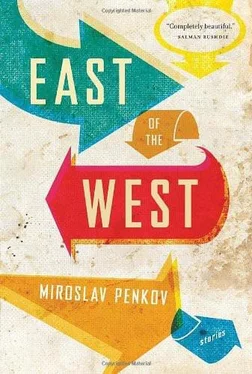The door opened and her mother walked in wearing a bathrobe. Her head was bald, not smoothly shaven like Kemal’s, but in patches. Under the robe Kemal could see that her mother held a pouch like the one she was holding.
“Where did your hair go?” Kemal asked her.
“It’s not that bad, really,” her mother told her.
They watched each other, silent, water dripping from under the robe and the drops drumming on the sheets on plastic.
7.
It was tobacco harvest, so out the window Kemal watched the road, dark now before sunrise, busy with carts and people. She could hear women singing, and their children fussing on their backs, sleepy in rucksacks. Oil lamps shone and torches burned, and as the carts rattled and as the people climbed the mountain they looked like a snake just hacked to pieces, one piece thrashing and chasing the other, no pieces connecting. But she would not pick tobacco.
Her father had once more taken up making his bagpipes. “We need the money,” Kemal had heard him say to her mother. “If you need something,” he’d told her, “just blow in this chanter.” So in the workshop Kemal helped him fulfill an order: thirty bagpipes for three schools in the region. They worked in the mornings, yet their work did not flow well. Every so often her father stopped and scolded Kemal to be quiet. “Is that,” he’d say, “a chanter blowing?” At lunchtime he went to take care of her mother, while Kemal kept on working. Goatskins lay in piles around her and waited to be turned to meh s. Old, dry wood sat in the corners, plum, dogwood, and in boxes, for decoration, black buffalo horns, shiny in the noon sun. She felt good in the workshop. She even ate there, goat cheese and white bread, and drank well water from a sweaty jar, while sawdust spiraled and stuck to the jar walls.
“There is one thing,” her father said once, “I’ve heard from the old masters. One hundred bagpipes, if played together over a sick man, chase death away.”
One hundred bagpipes, Kemal wanted to tell him, was a lot of bagpipes. How would they find skins, all at once, for a hundred bagpipes?
That night, in the yard, Kemal helped him dig up a cooking pot from under the pear tree, a pot stuffed with rolled bills. With the money, they’d buy more skins. The same week her father canceled the three school orders. But in his telegrams to the headmasters he did not speak of the advances he’d been given, nor of the raw skins he’d already purchased with Party funding.
8.
It was a week after the canceled orders that a militia sergeant stopped by the workshop. They sat him down under the trellised vine, and Kemal’s father sent her to draw a pail of well water. She poured a jar for the sergeant and one for her father, and watched her father lift his jar with trembling hands, and the sergeant drink in bird sips.
“Good water, this,” the sergeant told her. “I was thirsty.”
She kept her eyes on the gun in his holster and said nothing. Her father cleared his throat and asked her for more water.
“There have been Party orders,” the sergeant started, “straight from the Politburo. Unfortunate business, but no way around it. I’ve been walking from door to door all morning, informing people. Now, if you ask me, it’s ugly business, but no one asks me. It’s Party orders, straight from the Politburo.” And he told them: All Turks, Pomaks and other Muslims would be given new, Bulgarian names. If you lived in Bulgaria, he said, then you had to have a Bulgarian name. If you didn’t like it, no one stopped you from leaving for Turkey. “Be at the square tomorrow. The buses will take you to town for your new passports.”
“Nachalstvo , my wife is sick in bed and can’t ride buses.”
“Nobody asks me,” the sergeant said, stood up and saluted.
9.
It rained while they waited for the bus to get them. There was no awning on the square and they did not own umbrellas, so Kemal’s father had brought goatskins. He held one with his hand shaking over her mother, but still the rain pounded. Kemal knew all eyes would be on them — look how pale Zeynep is, people would say of her mother, how the sickness has eaten her innards, how Allah has cursed her — so she hid far away under her goatskin, also watching. No wind blew, and still her mother clutched the edges of her head scarf tight in one hand. With the other she held her dress, the nylon pouch underneath it, Kemal imagined. She looked like a spotted goat, poor, sick Zeynep, steaming in the cold, her dress dry in spots and wet in others.
When the bus arrived her father lowered the goatskin and all the rain the skin had collected splashed over her mother. There was laughter, so in the bus Kemal sat back, away from her parents. Everything smelled of wet head scarves, of wet mustaches, and the windows misted with people’s breathing. With her sleeve Kemal wiped a tiny pupil and watched the slopes run muddy rivers, until again the window misted. A few times the bus stopped to pick up more people, a few times for her mother to retch in the bushes. Kemal hid under the stinking goatskin and listened.
“Last night I had a dream,” a man was saying. “I’m in line waiting for something. My mouth is cracked from thirst and my stomach is churning. The line is long I tell you, not a line but a rope of people. And all I can hear is crying to make your hair stand like budding tobacco. Only it’s not crying but a million stomachs churning, hungry from waiting. At last it’s my turn at the front, and there before me stands my grandfather — a giant, I tell you, with his mustaches waxed and shiny like oiled hoofs, twirled on the sides the size of ram horns. Behind Grandpa, wide as the world, shine the gates of heaven. I can see in his hand a tray of figs, so ripe their honey flows out of them in rivers, and in his other hand a tray of thorns, the bitter hell fruit. ‘What’s your name, boy?’ Grandpa asks me, and from his voice I go slack in the knees, and from the ripe figs my stomach churns harder. I tell him what my name is. ‘It’s Mehmed,’ I tell him, ‘so give me a fig, Grandpa. Let me pass through the good doors.’ ‘Mehmed, eh?’ the giant says. Right then his mustaches unwind, I tell you, and turn to hands, my mother’s hands, and hold a thorn ball to my dry lips. “That’s a thorn ball, Grandpa,” I cry, and the giant starts laughing.
“Well, change its name, then, traitor. Call it a fig and feast on it in the Jahannam.”
At this, the women in the bus commenced weeping. But the men, who this rambling had amused more than frightened, clapped their hands in roaring laughter. “Don’t listen to this drunkard,” an old grandfather told Kemal. He must have seen her shiver under the goatskin. Her lips were chapped with thirst and her stomach was churning. Then the old man twisted his mustache, leaned in and asked her, “What’s your name, boy?” and around her the men once more burst laughing.
10.
In the militia department the line went up for three stories. Kemal was forced to wait beside her mother. It was dim in the hallway and Kemal could see no colors, no sharp edges, and so her mother seemed almost peaceful for the first time in a whole year. She wanted to hold her hand then, and tell her not to grip the scarf so hard, not to mind a head without hair. Instead, she held a notebook someone gave her, and in the notebook, pages and pages of first names. Proper. Bulgarian. Aleksandra, Anelia, Anna, Borislava, Boryana, Vanya, Vesselina, Vyara .
It was three hours before she stood at the front of the line.
“Whatever happens in there,” her father said, “you must forget it.” Then Kemal stepped in a room, with a desk, with a man behind it writing names in a book, with a dead ficus in the corner, with a portrait of Todor Zhivkov askew on the wall, with a floor muddy from the boots of other people.
Читать дальше











